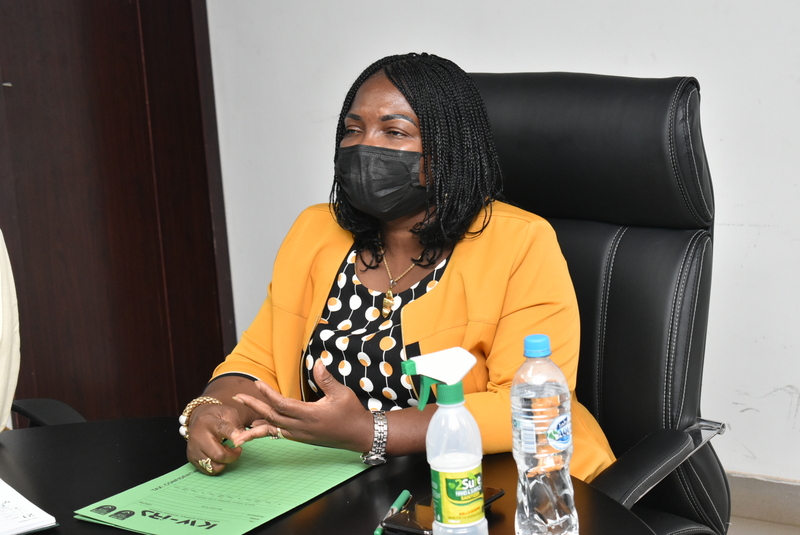Economy
Kwara Digitisation Process Yields Result as Annual IGR Hits N27bn

By Modupe Gbadeyanka
About N27.0 billion was generated in 12 months by the Kwara State government as internally generated revenue (IGR), 95.61 per cent lower than the target it set for 2021.
This disclosure was made by the Kwara State Internal Revenue Service (KW-IRS) and it is coming a year after the state and the nation were locked down as a result of the coronavirus pandemic.
For about six months in 2020, the federal government imposed a lockdown in the country to curtail the spread of the deadly virus, causing businesses to either shut down or operate remotely, affecting revenue generation.
In a statement signed by the Executive Chairman of KW-IRS, Ms Shade Omoniyi, it was stated that the agency projected to rake N29.2 billion in the year under review but it was unable to meet this target.
However, the funds generated last year remains the highest annual IGR recorded since the agency was founded in 2016.
Analysis indicated that in the first quarter of 2021, KW-IRS raked N9.6 billion and in Q2, it raked N6.5 billion and in the third and fourth quarter of the year, it generated N5.7 billion and N5.2 billion respectively.
Ms Omoniyi attributed the decline in the IGR from Q2 to Q4 to challenges associated with general apathy in the adoption of some newly introduced revenue collection processes, non-remittance, as well as seasonal collections.
But she said the annual rise in IGR was buoyed by “the gradual recovery of the economy after the pandemic, continuous consolidation and digitization of all revenue lines of the state, both of which are helping to reduce revenue loss, leakages, and diversion of revenues accruable to the state government.”
She assured that the agency is not relenting in its efforts of provision of seamless tax administration, continuous tax advocacy through various mass media platforms and stakeholders’ engagement to ensure tax compliance, prompt payment and remittance of tax arrears, eradication of under deductions and non-remittance of taxes due on income.
Ms Omoniyi this year, the organisation plans to consolidate on the digitization process which aims at achieving taxpayers’ convenience, as some of our major structural improvements include the Self-Service Portal where taxpayers could perform basic tasks in the comfort of their locations.
She noted that in 2022, the agency will broaden its tax net and make IGR collection seamless in the informal sector as several initiatives introduced at the Kwara State capital will be taken to all the local government areas with its continuous expansion of operations to all councils and the recruitment and deployment of additional 100 staff for improved efficiency at the grassroots.
The KW-IRS chief further said the agency will introduce cashless payments schemes in several touchpoints across the state with the consolidation of payment platforms and continuous improvement on its automation system across board.
She further assured that as the year 2022 progresses, KW-IRS will continue to establish more profitable partnerships and effective work relationships with all stakeholders for smooth revenue administration and strategic development of the state.
“The Service remains committed to improving its processes, promoting collective work ethics, and seamless provision of tax administration for the growth of Kwara State IGR,” the statement added.
Ms Omoniyi charged all business owners in the state to register their businesses with the KW-IRS, ensure tax returns are done within the time allowable by law, declare all sources of income for appropriate assessment, and pay all that is due on income as tax within the stipulated time.
Economy
Minister Woos European Investors With Nigeria’s Steel Industry

By Adedapo Adesanya
Nigeria’s Minister of Steel Development, Mr Shuaibu Abubakar Audu, has told European investors that the country’s steel sector alone consumes about $10 billion annually, presenting a huge market opportunity for serious global players.
In a statement by the Director of Information and Public Relations in the ministry, Ms Salamatu Jibaniya, it was stated that the Minister made this disclosure when he took Nigeria’s industrialisation drive to Germany, declaring that the country is ready to trade its abundant raw materials status and embrace full-scale value addition.
Addressing the Nigeria–German Economic Forum in Dortmund, Mr Audu projected Nigeria as Africa’s next industrial hub, in line with the Renewed Hope Agenda of President Bola Tinubu.
“With a population of nearly 250 million, largely youthful and energetic, Nigeria is primed for industrial take-off,” he said.
He disclosed that the country holds over three billion tonnes of iron ore, alongside vast deposits of limestone, manganese, copper, lead-zinc, lithium and rare-earth minerals, positioning Nigeria for both domestic industrial growth and export expansion.
Mr Audu urged EU investors to key into steel and aluminium production, mineral beneficiation and processing, as well as critical infrastructure development covering power, rail, gas and ports.
He stressed that beyond capital inflow, Nigeria is prioritising technology transfer and technical skills development to strengthen local capacity.
At the high-level forum, the minister was received by Germany’s Minister for Federal, International and European Affairs, Mr Nathanael Liminski; Lord Mayor of Dortmund, Mr Alexander Kalouti; President of the Dortmund Chamber of Commerce and Industry, Mr Heinz-Herbert Dustmann; and Consul General to Slovakia, Mr Klaus Wagener.
Economy
Sunbeth Offers N100bn Commercial Paper to Boost Cocoa Export Value Chain

By Aduragbemi Omiyale
To boost Nigeria’s cocoa export value chain, Sunbeth Global Concepts Limited has secured approval to issue commercial papers worth N200 billion to investors.
In the first tranche, the cocoa exporter will sell the debt instrument worth about N100 billion in three series across three tenors of 180 days, 270 days and 364 days.
Subscription for the CP commenced on Friday, February 27, 2026, and will close on Thursday, March 5, 2026, with allotment and settlement scheduled for Friday, March 6, 2026.
Interested investors can purchase the commercial papers with a minimum of N5 million and in multiples of N1,000 thereafter.
The company stated that proceeds from the exercise would be used to finance contractual working capital requirements, including inventory procurement and the execution of physical and hedged offtake obligations within its export operations.
The Chief Operating Officer of Sunbeth, Mr Nzubechukwu Anisiobi, said the programme reflects the firm’s disciplined capital strategy and strong credit fundamentals.
“The establishment of our N200 billion Commercial Paper Programme reflects our disciplined capital strategy and solid credit profile.
“In a working capital-intensive export business, access to structured short-term funding strengthens liquidity, supports efficient contract execution and preserves balance sheet stability,” he stated.
Further emphasising investor confidence in the company’s governance and risk framework, he noted that, “The Programme underscores the confidence the capital markets have in our governance standards, earnings resilience and robust risk management discipline.”
Sunbeth, which is a top-five non-oil export contributor in Nigeria, was established in 2017 and has exported over 200,000 metric tonnes of cocoa beans and 60,000 metric tonnes of cashew nuts to international markets.
In 2025, it recorded over N600 billion in revenue, reinforcing its scale within Nigeria’s agricultural export ecosystem.
The organisation works directly with more than 30,000 farmers and collaborates with over 250 local buying agents across Nigeria.
Its global strategic partners include Cargill, GCB Group, JB Cocoa, Touton, Macquarie and StoneX, enabling diversified offtake and multi-destination market access across Europe, Asia and the United States.
Economy
Unlisted Securities Market Gains 1.88%

By Adedapo Adesanya
Five price advancers buoyed the NASD Over-the-Counter (OTC) Securities Exchange by 1.88 per cent on Tuesday, March 3, as the demand for unlisted stocks continues to grow.
During the session, the market capitalisation added N46.64 billion to close at N2.524 trillion versus the Monday session’s N2.477 trillion, and the NASD Unlisted Security Index (NSI) increased by 77.94 points to finish at 4,219.47 points compared with the previous day’s 4,141.53 points.
11 Plc gained N13.23 yesterday to sell at N290.23 per share compared with the preceding session’s N277.00 per share, FrieslandCampina Wamco Nigeria Plc appreciated by N7.76 to N117.76 per unit from N110.00 per unit, Central Securities Clearing System (CSCS) Plc improved by N7.05 to N84.05 per share from N70.00 per share, First Trust Mortgage Bank Plc added 17 Kobo to close at N1.92 per unit versus N1.75 per unit, and Industrial and General Insurance (IGI) Plc advanced by 4 Kobo to settle at 49 Kobo per share versus 45 Kobo per share.
On the flip side, Food Concepts Plc dropped 37 Kobo to sell at N3.39 per unit compared with the previous day’s N3.76 per unit, and NASD Plc dipped 20 to N56.21 per share from N56.41 per share.
On Tuesday, the volume of securities went down by 19.6 per cent to 1.4 million units from 1.8 million units, but the value of securities increased by 447.2 per cent to N93.4 million from N17.1 million, and the number of deals soared by 118.5 per cent to 59 deals from 27 deals.
At the close of transactions, CSCS Plc remained the most active stock by value (year-to-date) with 35.8 million units sold for N2.2 billion, trailed by Okitipupa Plc with 6.3 million units worth N1.1 billion, and Geo-Fluids Plc exchanged 122.8 million units valued at N480.4 million.
The most active stock by volume (year-to-date) was Resourcery Plc with 1.05 billion units worth N408.7 million, followed by Geo-Fluids Plc with 122.8 million units worth N480.4 million, and CSCS Plc with 35.8 million units transacted for N2.2 billion.
-

 Feature/OPED6 years ago
Feature/OPED6 years agoDavos was Different this year
-
Travel/Tourism10 years ago
Lagos Seals Western Lodge Hotel In Ikorodu
-

 Showbiz3 years ago
Showbiz3 years agoEstranged Lover Releases Videos of Empress Njamah Bathing
-

 Banking8 years ago
Banking8 years agoSort Codes of GTBank Branches in Nigeria
-

 Economy3 years ago
Economy3 years agoSubsidy Removal: CNG at N130 Per Litre Cheaper Than Petrol—IPMAN
-

 Banking3 years ago
Banking3 years agoSort Codes of UBA Branches in Nigeria
-

 Banking3 years ago
Banking3 years agoFirst Bank Announces Planned Downtime
-

 Sports3 years ago
Sports3 years agoHighest Paid Nigerian Footballer – How Much Do Nigerian Footballers Earn












